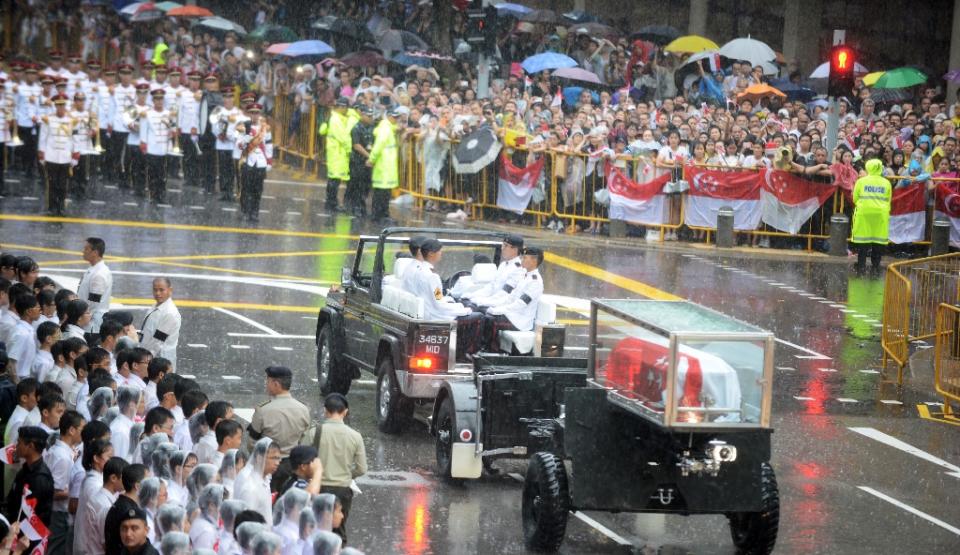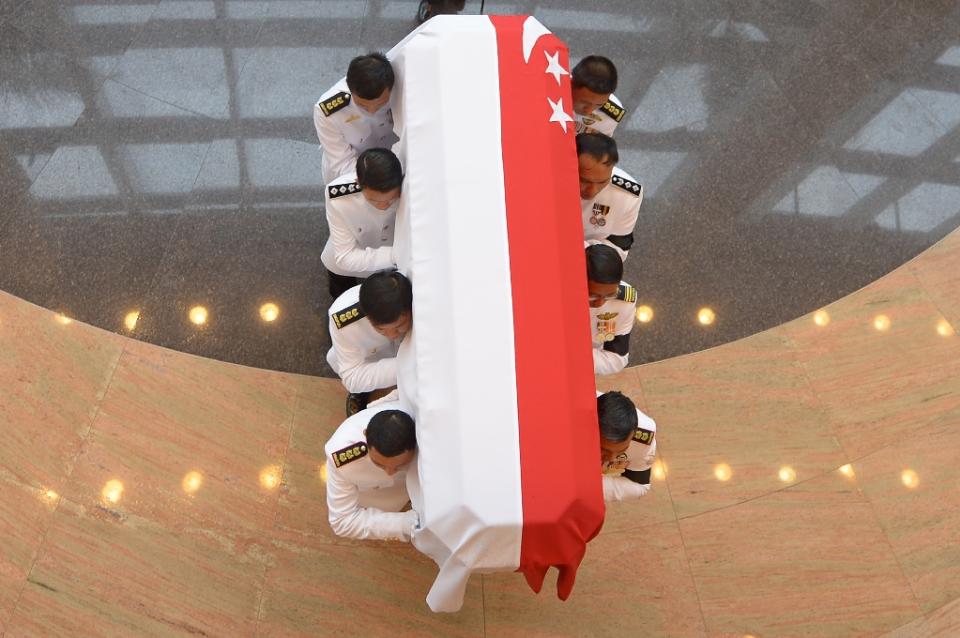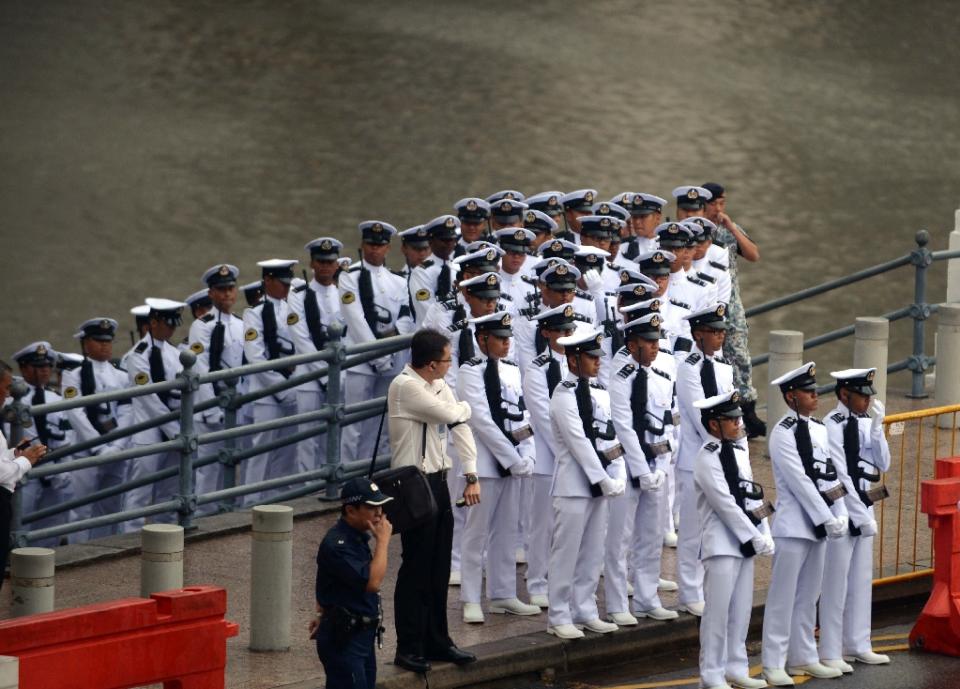More than 100,000 people lined Singapore's streets to bid farewell to its founding father Lee Kuan Yew on Sunday, officials said as a week of mourning ended in the city-state he led to prosperity.
Torrential rain soaked the crowds as howitzers fired a 21-gun salute to the country's first prime minister and jet fighters screamed across the sky in a grand farewell normally reserved for a head of state.
"The light that has guided us all these years has been extinguished," his son, Prime Minister Lee Hsien Loong, told a state funeral attended by 2,200 people including Asia-Pacific leaders at the National University of Singapore.

The body of former prime minister Lee Kuan Yew is transferred atop a gun carriage
Lee's coffin, draped in the red-and-white national flag and protected by a glass case atop a two-wheeled gun carriage, was taken in a procession from parliament to the university with close to 2,000 police officers ensuring security.
Officials said 454,687 people -- in a nation with just 3.34 million citizens -- had paid their last respects to Lee, 91, before his wake ended in parliament on Saturday.
People chanting Lee's name wept openly, waved miniature flags and threw flowers on the street as the motorcade drove through districts associated with his 60-year political career.
Four air force F-16 jets staged a fly-past as the cortege made its way through a square where Lee was first sworn in as prime minister in 1959.

The body of former prime minister Lee Kuan Yew arrives at the University of Cultural Center
He kept the position for 31 years, ruling with an iron fist to transform Singapore from a sleepy British colonial outpost into a gleaming metropolis that now enjoys one of the world's highest standards of living.
Singapore became a republic in 1965 after a brief and stormy union with Malaysia.
Lee died less than five months before the island celebrates its 50th anniversary as a nation on August 9.
- 'Our national hero' -
Civil defence sirens sounded across the island at the start of one minute of silence during the state funeral.
It ended with the singing of the Malay-language national anthem "Majulah Singapura" (Onwards Singapore), after which Lee's remains were driven to a suburban crematorium with mourners still lining the roads.
Lee said in a note to his children in 2011, one year after the death of his wife of 63 years Kwa Geok Choo, that "for reasons of sentiment, I would like part of my ashes to be mixed up with Mama’s, and both her ashes and mine put side by side in the columbarium".

Mourners pay their respects to Singapore's late former prime minister Lee Kuan Yew
One of the mourners on the streets on Sunday was Tan Yen Lee, 26, a nurse at the Singapore General Hospital where Lee died on Monday after a seven-week confinement for severe pneumonia.
"We have seen over the last week amazing scenes, a massive outpouring of emotion for our national hero, and it culminates today," she told AFP.
Strangers huddled together under umbrellas and families came early to grab choice spots along the 15-kilometre (10-mile) route of the funeral procession.
"As Singaporeans we may have our differences, but when it comes to a crunch we stand together. That is what Singapore is about and that is Mr Lee's legacy," said teacher Joel Lim, 35.
Lee stepped down in 1990 in favour of his deputy Goh Chok Tong, who was succeeded by Lee's son.
- Reconciliation call -
Former US president Bill Clinton and Lee's close friend former US secretary of state Henry Kissinger, Japanese Prime Minister Shinzo Abe, South Korean President Park Geun-Hye, Australian Prime Minister Tony Abbott, Indian Prime Minister Narendra Modi, Cambodian Prime Minister Hun Sen and Indonesian President Joko Widodo were among the dignitaries in attendance.
William Hague, the former foreign secretary and current leader of the House of Commons, represented old colonial ruler Britain.

Members of a guard of honour prepare before a funeral procession for Singapore's late former prime minister Lee Kuan Yew
Lee, a British-educated lawyer, is revered for his economic and social legacy but criticised by rights groups for sidelining political opponents, muzzling the press and clamping down on civil liberties.
A number of his opponents went bankrupt due to costly libel damages or went into self-exile.
Phil Robertson, deputy Asia director for Human Rights Watch, called on Singapore to mark Lee's passing by reconciling with the dwindling number of political exiles still afraid to return home.
Singapore now has one of the world's highest gross domestic product per capita incomes at $56,284 in 2014, from $516 when it gained independence.
Ninety percent of Singaporeans own their homes thanks to a public housing scheme launched by Lee, the crime rate is low, and highly paid civil servants are consistently ranked among the world's most honest.A recent study from Mumbai estimates that pollution in Delhi and other Indian cities could reduce the life expectancy of 660 million Indians by more than three years.
Pollution levels in New Delhi remain at dangerously high levels, causing the majority of the Indian capital's 17 million residents, especially those living closer to industrial pockets, to suffer from respiratory conditions such as coughing and wheezing.
Air pollution levels in the world's most polluted city New Delhi may have exceeded the World Health Organisation's prescribed limits. And a recent study from Mumbai estimates that pollution in Delhi and other Indian cities could reduce the life expectancy of 660 million Indians by more than three years.
Residents across the subcontinent have been feeling the effects of inhaling toxic air. Delhi resident Tarun Aggarwal said: "In just a few minutes, one starts getting breathless, eyes start watering, there is a burning sensation in the eyes even when you stand for two minutes at a traffic light."
Health professionals have warned against the dangerous cocktail of ailments linked to deteriorating air quality. Dr O P Yadava, a cardiothoracic surgeon at the National Heart Institute, said: "Probably pollution affects any and every organ of the body, but the heart and the lungs are the two main problems. We see there is an increase in incidents of lung infections and bronchitis."
It’s not just locals that have been affected. Foreign diplomatic missions based in India have started taking precautions against the high pollution levels. The US Embassy for instance has started to monitor outdoor air quality while the European Union has directed its diplomats in New Delhi to install air purifiers at their workplace and in their homes.
But environmentalists say it's not too late to combat air pollution. They have urged the government to enforce tougher measures. These include constant air monitoring, improving the public transport system, supplying cleaner fuels, limiting the growth of private vehicles and revising emission norms for industries.
Sunita Narayan, director of Centre for Science and Environment, said: "The level of pollution in Delhi is definitely toxic, it is definitely bad. I am not going to get into the debate of whether Delhi is little better than Beijing or little worse than Beijing. We do not want to be ranked in the world in terms of how bad we are. I think what we need to accept is the level of pollution in Delhi is a public health emergency."
But balancing the urgency to deal with dangerous air quality levels and the public's resistance to behavioural change has been a challenge. Public pressure recently forced authorities to revoke the ban on the use of 15-year-old passenger vehicles - a sign, perhaps, that it will take more than good intentions to clear the air.

Leave your comment on this story